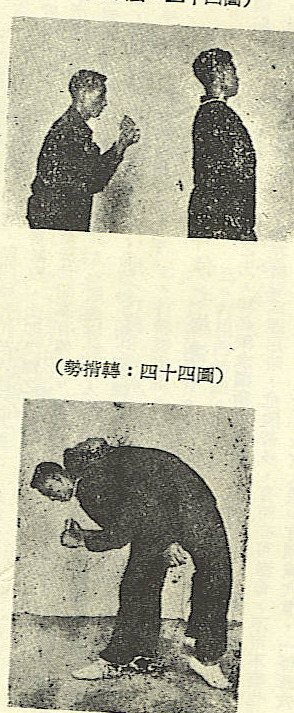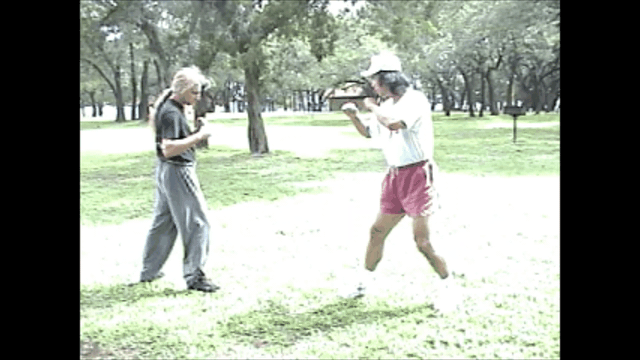This is Exactly what you have been doing the whole time. You are beating a dead horse, saying the same thing over and over....and over. It questions your limited knowledge of the subject. You are great in the abstract.
I'm not sure you and I share the same definition of the word "abstract." As I said to Gerry, I've been trying to be as specific and concrete as I possibly can. You aren't asking questions and don't seem to want to clarify any misunderstandings. You just keep coming back with ad hominem attacks and declarations that my posts are common knowledge. If you agree with me, I wonder why you're so hostile about it.
With that out of the way:
A person training simply learns what a tool is, then learns how to use the tool, then how to use the tool with other tools, and then learns what else the tool can be used for. It is ALL application. You have skewed the meaning of this word into irrelevance. You are convinced there is some magic wall between learning skills and application. There is not.
If this is the nut, then yeah. I think we simply disagree. I mean, the wall isn't magical. But yeah, learning how something works isn't the same as learning how to make it work.
I've learned a lot about how a lot of things work that I can't do. For example, I know a lot about how to throw pottery. Intellectually, I know a lot more about HOW to throw pottery than I can demonstrate. My brain knows what it's supposed to look like, but I lack the experience to execute the skill.
So, forgive me if this is obvious, but the language you use causes me to question whether you really, actually do understand the difference. If you think a skill, any skill, can be learned without actually doing that thing, I welcome you to come up with an example. I can't think of one, though it's easy to come up with all kinds of examples of learning
about how to do things.
Yes, there are schools/instructor who violate good teaching but that is a much broader subject.
Good teaching is an entirely different kettle of fish. So far, I've tried to take that out of the equation by presuming that all of the training is sound.
All you have done here is repeated what
@Tony Dismukes said in a previous post about diversity in training. Nothing else.
Has it taken you this long to realize what he said earlier?
There's a lot Tony said that I agree with. In fact, I said exactly that in a post earlier. So, the question is, what's different? I'm either saying what Tony's saying, or I'm not. If you agree with him and not me, what's the difference? I responded to Tony, trying to explain where I thought we disagree.
How could there be a more 'nose on your face' question? That said, who knows exactly what the first day of training would involve? Very trainer specific. A good one is going to play to each person strengths. In the long term the training would converge into much the same thing.
ALERT: I'm going to use the term "apply" the same way I think you guys are using it. This may cause some confusion, but I hope not.
See, this is why things seem so obvious. It IS obvious... until we apply it to a "self defense oriented" school. For some reason, folks start to believe you can fake it. I think we can all agree that the person who has applied the skills outside of training will have the most success. The kickboxer's experience has prepared her better. Clearly. Obviously. Why then, are we reluctant to use this same clear, obvious, common sense evaluation when it comes to self defense?
I mean, substitute MMA school with whatever self defense scenario you can think of... they are both accosted by a group of angry ninja in a dark alley. Who would be better prepared to fight their way out? Once again, I think it's obvious that the kickboxer is better prepared. The context in which she applied the skills she learned makes it a "nose on your face" question. There are a lot of other obvious comparisons out there. An experienced, well trained soldier vs Tae Bo. An experienced, well trained cop vs Tae Bo. An experienced, well trained bouncer vs Tae Bo.
On the other hand, let's take this person who trains Tae Bo (with a self defense orientation) and someone who has five years experience training in Aikido (with a self defense orientation). Who's better prepared? Not so obvious. I mean, I could see it going either way, all other things being equal. What about Budo-Taijutsu and Tae Bo? Once again, I think folks around here who are being honest can come up with a lot of examples.
So, the ball is in your court. Frankly, I debated whether to even respond to this post or not. Way I see it, you can ignore this post and go on about your merry way, you can respond to the points in the post, or you can continue to stay off to the side and take pot shots. Honestly, I couldn't care less which you choose, but if the latter, I will put you on the ignore list and stop giving you any more of my time or energy. Then you can take whatever shots you like.



